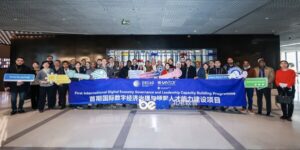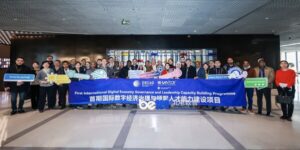Artificial intelligence industry powering city’s economy, with companies seeing 65 percent surge in profits
BEIJING, Oct. 28, 2025 /PRNewswire/ — A news report from chinadaily.com.cn
![ABB demonstrates new offerings powered by ABB Robotics' OmniCore single control platform. [Photo provided to chinadaily.com.cn] ABB demonstrates new offerings powered by ABB Robotics' OmniCore single control platform. [Photo provided to chinadaily.com.cn]](https://mma.prnasia.com/media2/2806774/20251023_ABB.jpg?p=medium600)
ABB demonstrates new offerings powered by ABB Robotics’ OmniCore single control platform. [Photo provided to chinadaily.com.cn]
Shanghai, as a leading hub for artificial intelligence in China, has been contributing its expertise to support AI development and global governance in recent years.
According to the Shanghai government, the industry has become a new engine for the city’s economy. By the end of the first quarter in 2025, the total industrial value of Shanghai-based AI companies with a minimum annual sales revenue of 20 million yuan ($2.8 million) had exceeded 118 billion yuan, up 29 percent year-on-year. The profit generated by these companies surged 65 percent year-on-year.
Shanghai has also seen the establishment of many AI communities which can provide support to different sorts of companies. For instance, the SMC Shanghai Foundation Model Innovation Center in Xuhui district mainly fuels large language model development companies, while the Model Magic Community in Pudong New Area mainly supports embodied intelligence and applications. The two communities are home to more than 700 AI businesses and can offer life-cycle financial support to businesses.
Over the past few years, Shanghai has promoted cooperation and communication within the AI industry. The annual World Artificial Intelligence Conference, inaugurated in 2018 in Shanghai, has become a key platform for global experts and businesses to exchange opinions on the latest developments and seek ways to address challenges.
The 2025 World AI Conference & High-Level Meeting on Global AI Governance, held in Shanghai in July, attracted more than 1,500 industry leaders, government officials, researchers and investors from more than 70 countries and regions. The three-day event, centered around the theme “Global Solidarity in the AI Era”, drew more than 300,000 visitors, with over 100 products making their global or China debut.
One of the key outcomes of the 2025 edition was the release of an action plan for global AI governance. It invites governments, international organizations, enterprises and research institutions to collaborate and promote international exchanges, including through a cross-border open-source community.
With significant strides made in AI ecosystem development, Shanghai is becoming a popular destination for developing such technology and products, as well as seeking partnerships for foreign investors in recent years.
Innovative core
Switzerland’s robotic technology giant ABB, which has been leading robotic industry development for more than 50 years, regards AI-powered innovation as the core of its future development.
According to the company, AI not only optimizes industrial processes, leading to improved efficiency and productivity, but also makes robots easier to use, reducing barriers.
Globally, ABB has more than 250 projects in its pipeline, spanning both analytical and generative AI. These include internal projects that optimize workflows and enhance efficiency, and external projects that are developed in close collaboration with customers to drive product innovation and unlock new value.
The Shanghai Mega Factory, one of ABB’s three such facilities worldwide and established in 2022, plays a crucial role in advancing the company’s AI development in China.
“The factory is not just a production site but also our testing ground for AI innovation,” said Henry Han, group senior vice-president and president of ABB Robotics Division in China.
“Our Shanghai Mega Factory and research and development center together form an innovation ecosystem encompassing research, production and application. This setup provides a solid foundation and assurance for AI technology to move from concept to practical implementation, ultimately empowering local customers,” he said.
In July, ABB launched three innovative robotic products from its Shanghai Mega Factory, targeting automation requirements across sectors such as electronics, consumer goods, and general industries. These new offerings — powered by ABB Robotics’ OmniCore single control platform that enables the full integration of AI, sensors, cloud and edge computing systems — are designed to handle tasks ranging from basic material handling to sophisticated applications such as dispensing and polishing.
The company said that the developments highlight ABB’s ongoing efforts to meet the rising demand for accessible and user-friendly automation solutions in China.
So far, supported by the Shanghai Mega Factory, ABB has produced 90 percent of its robots in China for local clients. It has also committed to increasing the localization of its supply chain in recent years.
Han said ABB, with roots in China dating back to 1994, will continue to use the capacity of its Shanghai Mega Factory to promote its “local-to-local” strategy to better serve businesses in China.
“Today, we continue to expand our robotics leadership in China, for China and beyond, building on our full local value chain of manufacturing, research and development to deliver groundbreaking solutions for our customers in businesses of all sizes,” said Han.
Shanghai boasts the most advanced production capacity of ABB in the world and will continue to be a strong arm to support the long-term development of the company.
“Reflecting on ABB’s 30 years of robust growth in Shanghai, we deeply appreciate the city’s excellent business environment, its atmosphere of innovation and its strong support for technological innovation in high-end manufacturing,” said Han.
“We are honored to have been a part of the city’s growth and are very optimistic about the prospects for smart manufacturing here. In the future, we hope to leverage Shanghai’s strong manufacturing foundation and mature industrial ecosystem to continue deepening our local presence. We look forward to resonating with Shanghai’s spirit of innovation and aligning with China’s modernization process,” he said.
Accelerating development
Siemens, which has been developing AI technology for more than 50 years, is accelerating its efforts in China by leveraging its expertise in the industrial sector.
According to Xiao Song, global executive vice-president of Siemens, and chairman, president and CEO of Siemens China, the country’s manufacturing industry is at a critical stage of high-quality development.
In emerging sectors such as battery manufacturing and new energy vehicles, China not only has large-scale and complete supply chains but is continuously shaping new advantages in global industrial competition. The rapid growth of these industries provides extensive application scenarios and a rich data foundation for industrial AI.
“Siemens is confident about future development in China. This confidence stems from China’s comprehensive industrial system, the most complete in the world, as well as its more than 6 million manufacturers, of which most are small and medium-sized enterprises that are active across various segments of the industrial value chain. Additionally, China fosters a robust atmosphere for innovation, further enhancing its appeal as a key market for Siemens,” said Xiao.
“The window of opportunity for industrial AI has opened, with China offering the most dynamic application landscape. It is fertile ground for incubating industrial intelligence. In the future, those who can effectively implement AI, run successful applications, produce tangible results and create value will seize the initiative in the new era of productivity,” he said.
Shanghai will continue to be a vital city in supporting the company’s journey in the AI world, according to the company.
“Siemens will continue to leverage its open digital business platform, Siemens Xcelerator, to further expand its AI collaboration network in Shanghai and the Yangtze River Delta, supporting local companies in accelerating product development and market deployment,” said Xiao. “The era of industrial AI has begun. China’s vast and diverse industrial system is becoming the most dynamic application scenario for AI, opening up new possibilities for a leap in productivity for Chinese industry.”
He added: “Siemens has been deeply involved in the AI field for over 50 years. With high-quality data, deep industry knowledge, and full-stack technical capabilities that combine software and hardware, we are continuously making breakthroughs in cutting-edge areas like ‘industrial foundation models’ and ‘industrial agents’. We are building an open innovation ecosystem that drives the transition from AI+manufacturing to manufacturing+AI, injecting new momentum into the transformation and upgrading of China’s manufacturing industry.”
Lighting the way
Signify, a key lighting solutions provider from the Netherlands, has established one of the largest R&D centers of the group and a Chinese institute in Shanghai to promote AI innovation and applications in the lighting sector.
“We focus on exploring the deep integration of AI technology and smart lighting systems in both professional and home lighting sectors, incorporating AI algorithms into lighting products and solutions to achieve more efficient energy management, more precise operational and maintenance decisions and a smarter, smoother user experience,” said Liu Haitao, head of Research China of Signify.
Liu said Signify has launched several AI-driven lighting products and solutions in the Chinese market.
In May, Signify introduced its first industry-specific generative AI agent globally for lighting management systems. This generative AI agent has been integrated with Signify’s smart connected road lighting system, Interact City Flex, to empower smart streetlight system development in Shanghai and other cities around China, according to Liu.
In addition, during the 2025 China International Import Expo, set to run from Nov 5 to 10 in Shanghai, Signify will launch a new home lighting solution which redefines the relationship between lighting and human mood, said Liu.
Apart from bringing AI solutions to its clients, Signify integrates AI into its production processes to enhance operational efficiency and gain deeper market insights. In 2024, Signify launched its enterprise-level generative AI tools within the group to help employees innovate their working style.
“The value of AI technology lies not only in the innovation itself but also in how it truly empowers employees and enhances organizational efficiency. The implementation of Signify GenAI Tools is a significant practice in turning this concept into reality and provides the industry with a model for digital transformation,” said Liu.
Eyeing emerging potential in AI development, Signify will continue to integrate AI with its lighting solutions to support urban development in various aspects.
“We will focus on key areas such as smart buildings, healthy living environments, and urban sustainability, and further promote the integration and innovation of AI technology with lighting solutions. This includes expanding their intelligent applications in scenarios such as offices, healthcare and hotels,” said Liu.
“Our goal is to transform lighting systems from basic functional services to intelligent perception and autonomous decision-making. By leveraging smart lighting environments, we aim to empower the digital transformation of cities and build a more efficient, human-centric and sustainable urban ecosystem for the future,” Liu added.



